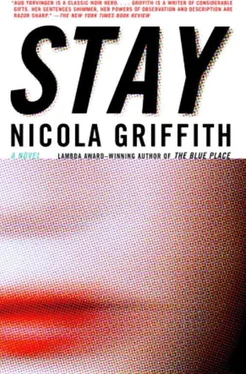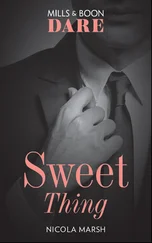The next morning I left the trailer at a campsite and drove back to the Carpenters’, where I parked my truck off the road, just below the rise, invisible from the house. I put what I needed in a pack and climbed the hill. It was a mild day for November, in the high fifties. I unrolled my camping mat, poured tea from the thermos, and opened a Sara Wheeler book about Antarctica. Read, relax, and wait. Everything was planned, every eventuality taken into consideration; I had nothing to worry about. After a while I closed the book and watched the sky.
The sound of a truck engine blew like dust into my daydream of mariachi bands and black-haired, snapping-eyed Mexican girls parading their finery in the town square. I rolled onto my stomach. The field glasses showed four people on the bench seat of the Carpenters’ pickup. Five minutes after they drove by, I was pulling up on the bare dirt in front of their house. Up close, I saw that although the siding wasn’t exactly peeling, it wouldn’t hurt to retouch the paint, at least on the southern side. Pink chrysanthemums brightened the doorstep in tubs to either side. I put on my new gloves; they smelled of leather.
No dogs. I called out, waited. Nothing. The first farm I’d ever been to without animals. The lock took less than a minute. I took my pack inside.
The hallway was wide and warm. An embroidery sampler hung behind glass on the wall opposite the stairs. Do unto others… The colors on the lower left had faded, as though it had once hung in strong sunlight. There was no scriptural attribution—something I would have expected in a fundamentalist household—and the unfinished phrase seemed sinister. The kitchen was in the back. Watery winter sunlight glittered on the still-wet white enamel sink; the last time I’d seen one of those had been more than twenty years ago, in a poor town in Yorkshire. Beef and vegetable stew with dumplings simmered in a crock pot next to the stove. A bright red coffee mug stood half full on a large sixties dining table that was topped with yellow-and-blue Formica. It was the kind of kitchen where a lot of family conversations happen. I stuck the first receiver to the underside of the table.
Upstairs, there were four bedrooms, one large and one small on each side of the hallway. In the large one on the front side of the house, a sewing table and Singer were pushed up against the wall under the window. Someone was making a pair of child-sized pajamas from blue-and-white-checked flannel. A long, plain table with two wooden chairs faced another, smaller table and single chair. Home schooling. A map of the world, still depicting the USSR and Ceylon, hung behind the teacher’s chair, and the rest of the walls were covered in bright children’s pictures. Some were huge, incomprehensible splashes of orange and brown and yellow, but many were careful pencil drawings—a house with a picket fence, a church, a lopsided rose, a cat, a cow—and still others neat, geometric patterns drawn in felt-tip pen, painstakingly colored between the lines. Which were done by which child? There was one painting in the same careful style as the pencil drawings: a river with bright birds in stiff-looking trees and hills with tiny buildings in the background. One of the buildings had the arched windows and big doors, the sloping roof of a Catholic church. So. A bookcase contained several versions of the Bible, and a variety of children’s Christian books. The Young Lady’s Guide to House and Home. What God Hath Wrought , which seemed to be an earnest explanation of the Creation. There were also reading primers, and several fiction books with Plaume City Library stamps, such as volumes two and three of the Narnia series. C. S. Lewis seemed a bit exotic for a Church of Christ household. On a high shelf, out of a child’s reach, sat a set of Collier’s encyclopediae. I checked the copyright date: 1961. The first volume seemed to be missing. A small cupboard next to the sewing machine was locked.
Down the hall, with a view of fields, I was greeted in the smaller room by a wallful of cheerful young-boy motifs: cartoon steam trains and cowboys and Indians. The bedside lamp could not be reached from the bed, and a small wire cage made it impossible to tug the plug from the socket. Not the usual precautions for a seven- or eight-year-old. The armchair next to the single bed looked old and well used. The drawers did not spill clothes; no toys or gadgets cluttered the floor; no stacked music system or computer sat on shelves against the wall. Poverty, or perhaps just an empty mind. Next door, the parents’ room held a double bed with a mattress that should have been replaced years ago, and an unremarkable, cheap dresser. Like the boy’s room, it was clean and neat, with one of every necessity, but everything was worn, or old-fashioned, and the only luxury was a silver-backed dresser set of hairbrush, comb, and mirror, whose perfect centering before the mirror made them treasured possessions. The design was something from the seventies, perhaps a wedding present. The rag rug was relatively new: handmade. I imagined Adeline Carpenter sitting in front of the mirror, brushing out her hair before bed, talking, and I put the second receiver under the lip of the dresser.
Luz had a tiny room, with a narrow bed that faced the window with its view of scrubby Arkansas countryside and minor road. No chair here for a mother sitting in the dark, watching over her child. On the bedside table sat the fourth Narnia book. The lamp next to them worked. The long nightdress folded neatly on the pillow was made of the same blue-and-white check I’d seen in the schoolroom. The foster daughter may have got the worst room, but she had the first nightclothes. Interesting. I put the third receiver behind the headboard; maybe Luz sometimes talked to herself.
I found the missing encyclopedia under the mattress. A scrap of paper divided atlatl (an implement used for hurling spear or lance) from atmosphere (the gaseous envelope surrounding the earth). I thought of all the households in this country that would rejoice at a child’s ferocious need to learn, of the fact that this book had been hidden away, and wanted to push Adeline Carpenter’s face into the stew to boil along with her dumplings.
The booster transceiver went in the pot of chrysanthemums by the front door. On the way back to the trailer, I threw the barbiturate-saturated hamburger into a convenience store Dumpster.
According to the Arkansas Church of Christ’s website, Sunday services in Plaume City ran from ten-thirty to one. It seemed like a long time to expect children to sit still, but it gave me the opportunity to change and drive the twelve miles to the church well before the end of services. Small communities tend to be suspicious of outsiders, and while my conservative clothes might escape casual attention while I was on church property, a woman on her own driving such a truck would not. Once everything was in place, it wouldn’t matter; until then, I couldn’t be too careful. I parked half a mile down the deserted road and walked the rest of the way with my oversize gas can and plastic tubing. If I saw anyone, they might assume I’d run out of gas and was walking to the nearest service station.
I have lived more than a third of my life in this country, but still, to me, the word “church” conjures images of tenth-century Norwegian stave churches, taller than they are long, or the Gothic cathedrals of England and France with their soaring stone buttresses and tall, slitted windows, and naves echoing with history. The red-brick, one-story Plaume City Church of Christ stood by the side of a road running from nowhere to nowhere, and, with its square windows and orderly parking lot, looked more like a library or care facility for the elderly than a church.
Читать дальше












